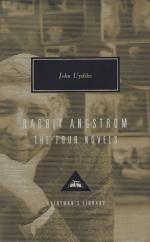|
This section contains 3,724 words (approx. 13 pages at 300 words per page) |

|
The interest of Updike as a moral fabulist is that his judgments are never univocal. By his own avowal, he has too much tenderness for his characters to condemn their follies. On the other hand, his sense of humor and his ethics do not permit him to let their foibles go unnoticed. He himself acknowledges this duality when he affirms that all his work says "Yes, but." We find the same ambivalence in the definition he gives of the people he considers as spiritually alive: "I feel that to be a person is to be in a situation of tension, is to be in a dialectical situation." Most of the charm of Updike's protagonists in general, and of Harry Angstrom in particular, is that, close to them as we may feel, we can never really anticipate the inconclusive ending to which their contradictions will lead them. We do...
|
This section contains 3,724 words (approx. 13 pages at 300 words per page) |

|


